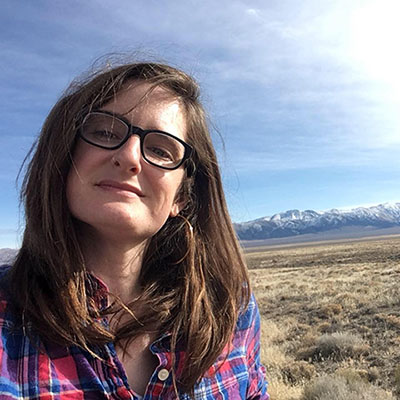Hunter Geography Alumni Focus
An Interview with Araby Smyth, MA, Geography, 2018
By Christina Santiago, Hunter College, English major
|
|
Araby Smyth is currently studying feminist economic geography in a PhD program at the University of Kentucky. Having attended Hunter College in the 2000s she received a B.A. in political Science in 2006, an MS in Geography and a Certificate in Geographic Information Science in 2015. Smyth has received some of the most competitive awards for her work as she continues to advance the development of her research topics. Two of the awards she received came from the Society of Women Geographers: Hunter SWG fellowship and a national Evelyn L. Pruitt fellowship for Dissertation Research. Smyth has also received the National Science Foundation Doctoral Dissertation Research Improvement Award and has recently had her work published in a top geography journal, Geoforum.
Why I study Geography?
I find geography to be a dynamic field which combines social and physical sciences that are constantly engaging with other disciplines. Geography becomes a unique subject by pushing us to think about how places matters. Whether it is a home or a workplace, in the city or a rural village, the history of a place remains significant as well as the people living and working in them. I study how global processes impacts our daily lives and geography provides me with the theoretical and methodological tools to better understand how the global is linked to the local processes. Our daily work, responsibilities and relationships are linked to global networks like human migration and remittance flows and it is for these reasons that I find geography to be a fantastic field.
What is your current research?
I am a PhD candidate in the Department of Geography at the University of Kentucky. The title of my project is Gender and Remittances: Lived experiences of women in Oaxaca, Mexico. This research utilizes feminist economic and political geography to investigate the gendered nature of remittances and their roles in disaster recovery in a rural indigenous town in Mexico. The goal of my research is to understand: 1) the precise ways that remittances are being managed after a natural disaster; 2) how women participate in remittance management at the household and community level; and 3) how the process of negotiating the use of remittances is transforming the responsibilities, labor, and political involvement of women. My research will contribute insights on the relationship between gender, labor, and citizenship as well as new findings on how global migration and remittance flows are mobilized by family networks and local communities in post-disaster situations.
What motivates your research?
I am a feminist economic and political geographer. The motivation that spurs my research projects, informs my pedagogy, and shapes my methods is rooted in my history as an activist in the anti-globalization, anti-police brutality, anti-war, pro-choice, and immigrant rights movements in New York City while I was a student at Hunter College. I am inspired by how people dream about putting our lives in common, how we face challenges together, find openings in unlikely places, and commandeer resources in hopes of transforming the capitalist and patriarchal framework that shapes how we are expected to think and live.
What do you love the most about being a PhD candidate and a future professor?
Teaching and mentoring undergraduate students is my favorite part of preparing to be a professor at a university. I enjoy honing my abilities to engage a caring and critical pedagogy that meaningfully prepares students for the responsibilities in our changing world. I was a teaching assistant for the undergraduate geography classes Digital Mapping and Immigrant America at the University of Kentucky. I began teaching my own courses a year ago with Mexico: Environment, Politics and Society and the Geography of Central and South America and the Caribbean.
In my classes at the University of Kentucky, my students and I collectively engage a variety of feminist and post-colonial materials. I guide them through complex themes such as social movements, revolution, land distribution and use, gender, and race in texts, articles, films, literature, and music. I ground our work on these difficult subjects by making the classroom a place of connection. My teaching style challenges and engages students with experiential learning (group projects, guest lectures, and field trips) that cross the boundaries between the text and their lives. Teaching that acknowledges multiple lived experiences is crucial to ensuring the success of students, particularly those whose path to and through college is uneven. By placing students closer to the ideas that they study, I hope that my classes give them a solid understanding of the complex processes that make up our diverse world.
How has Hunter Geography helped shape who you are today?
Hunter College shaped my abilities as a scholar and educator. Undergraduate and graduate level courses introduced me to feminist and postcolonial theory, the two main areas of thought that form the foundation of my research projects and philosophy as an educator. My doctoral dissertation research builds on my geography MA thesis completed at Hunter, which analyzed how Mexican hometown associations in New York City engage in solidarity through ethical economic practices of collective remittance sending and community service provision in New York City. My research methods included mapping with GIS, semi-structured interviews, and participant observation, all skills taught to me and through the guidance from advisors Marianna Pavlovskaya and Monica Varsanyi. Drawing on feminist literature on diverse economies, I argued that the solidarity work of hometown associations disrupts the dominant remittance as development discourse and is an attempt by migrants to distance themselves from neoliberal remittance policies. This research provided a foundation for the article “Re-Reading Remittances through Solidarity: Mexican Hometown Associations in New York City” that appeared in Geoforum in 2017. In addition to getting fantastic training as a geographer at Hunter College, I found the geography students across various CUNY campuses to be incredibly generous and supportive.
Published: August 2, 2018

